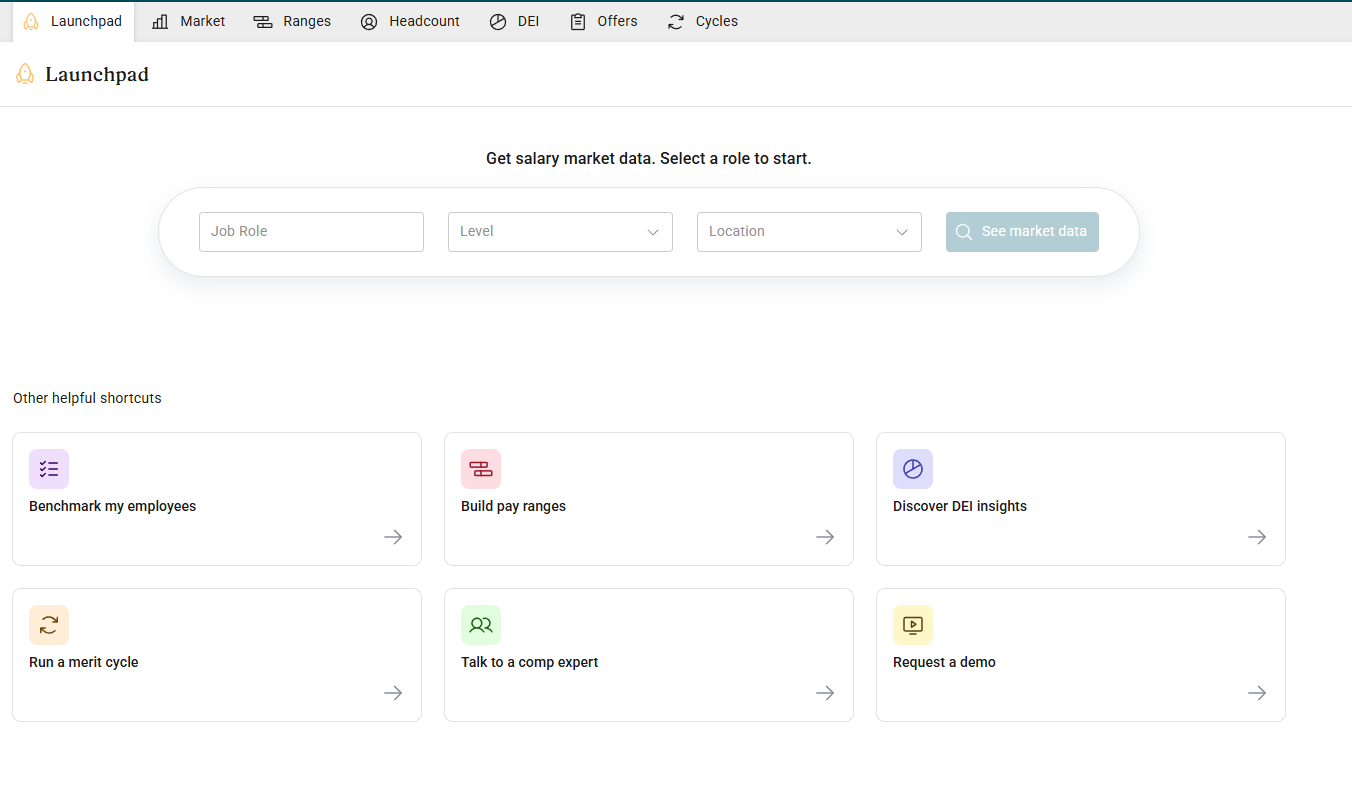Introduction

We spend hundreds of hours researching the best HR and recruiting software so you don’t have to. We never take money from vendors during our research phase and rely heavily on practitioners and experts to help us recommend the right software. However we may earn a small fee if you click on vendor links on this page.
OpenComp impressed us with its ability to bring order to compensation chaos. The platform takes the guesswork out of salary benchmarking, range creation, and merit cycle execution—especially for companies without in-house compensation experts. From our hands-on testing and product demo, we saw how OpenComp’s tools—especially the range builder, DEI insights, and cycle management—equip HR and finance teams with the confidence to make equitable, data-backed pay decisions.
Ratings
Ease of Use
Best For
Key Differentiator
Price
Free Trial
PROS
- Real-time compensation benchmarking using global market data.
- Proprietary range builder tailored to company comp strategy.
- Offer and merit cycle workflows that simplify approvals and audits.
- Total reward statements for employee transparency.
- Integrates with 12+ HRIS tools and offers a public API.
CONS
- Some users noted a lack of two-way sync with specific HRIS systems.
- No feature (yet) for managing terminations or backfills with level tracking.
- Pricing can scale into six figures for larger orgs with advanced features.
.png)
Deel
.png)
Deel

Aeqium

Aeqium

OpenComp

OpenComp
ChartHop
ChartHop

beqom

beqom

Need Help? Talk to an HR Software Advisor!
Tell us more about your company & an HR Software Advisor will help you find the right software








OpenComp is a compensation management platform built specifically for organizations with up to 1,500 employees that lack deep comp expertise within their HR departments. The tool was developed around the compensation philosophy of Nancy Connory, Salesforce’s first VP of HR. This foundational expertise is deeply embedded in the product, from how it helps set salary ranges to how it guides merit cycle decisions.
OpenComp’s Head of Customer Success showcased the platform’s clean UI and modular architecture during our in-depth product walkthrough. One standout is the comp range builder, which creates company-specific salary bands based on a short strategy survey. You can also import your ranges and benchmark them against live market data.
We also tested the offer tool, which lets hiring managers quickly draft and route comp offers with pre-approval paths and historical reference points. On the current employee side, OpenComp’s cycle tool automates salary increases, allows for budget controls, and incorporates performance data. We especially liked the real-time executive summary that shows budget burn, market position, and the percentage of workforce below range.
Regarding employee experience, the platform creates total rewards statements that break down each individual’s comp package, including base, equity, bonuses, and historical changes.
That said, there are some limitations worth noting. Several users report challenges with certain HRIS integrations, including a lack of real-time two-way sync. Additionally, OpenComp currently lacks native support for managing terminations and backfill tracking by job level—features that would be valuable for organizations with evolving team structures. Finally, while pricing is flexible, it can escalate quickly for larger companies implementing the full suite of advanced tools.


I use OpenComp primarily for salary benchmarking across our current team. I also use it during the talent acquisition process to develop fair salary ranges for candidates.
Another way I plan to use the tool is during our employee review cycle to inform compensation increases and promotions.
Recently, I’ve been using OpenComp daily as I’m focused on a specific project. Once that project is complete, I expect to use the tool less frequently—likely about once a week.

One reason I like OpenComp is that it was recommended and is trusted by our board. Another is that the interface is simple to use and easy to navigate.
My organization purchased OpenComp because we are a startup still building out our internal processes. We wanted to review our compensation benchmarking with the goal of creating a formal compensation philosophy. Our board requested that this document be created and specifically asked us to use OpenComp to support its development.
The main benefit OpenComp provides is access to a large compensation database, along with support to assist when you're unsure of correlating titles, geographic differences, and similar details. I have personally used the tool for about one month.
One thing I dislike is that it's clear the company is still in early stages. During my demo call, the main presenter had a negative attitude, seemed overworked, and didn’t provide the level of engagement or first impression I expected. Although they offer support, it hasn’t been very helpful so far.
I have only compared it to Pave. We chose OpenComp over Pave because OpenComp does not require a company-wide benchmark, which aligned better with our need to create a compensation philosophy. OpenComp also offered a better price.
When considering this tool, think about how you plan to use it and what outcomes you want to achieve. It's also important to evaluate whether the cost aligns with the value it provides. Since it can be expensive, make sure it fits your organization's budget and goals.
It is new to me, so I haven’t seen any changes yet.
I think OpenComp is a good fit for organizations of all sizes.
I believe OpenComp could be useful for any organization.
While OpenComp doesn’t publicly list clients, they have worked with recognizable names in ecommerce, fintech, media, and publishing.
OpenComp pricing starts at $4,500 annually for base features like benchmarking and offer creation. More advanced functionality, such as range creation, cycle management, and DEI tools, can increase the price.
OpenComp is ideal for growing companies that want to professionalize their compensation practices without hiring a full-time comp leader. If your HR team is spread thin and your finance team needs clarity and control over pay decisions, OpenComp delivers expert-backed tools that scale with you.








